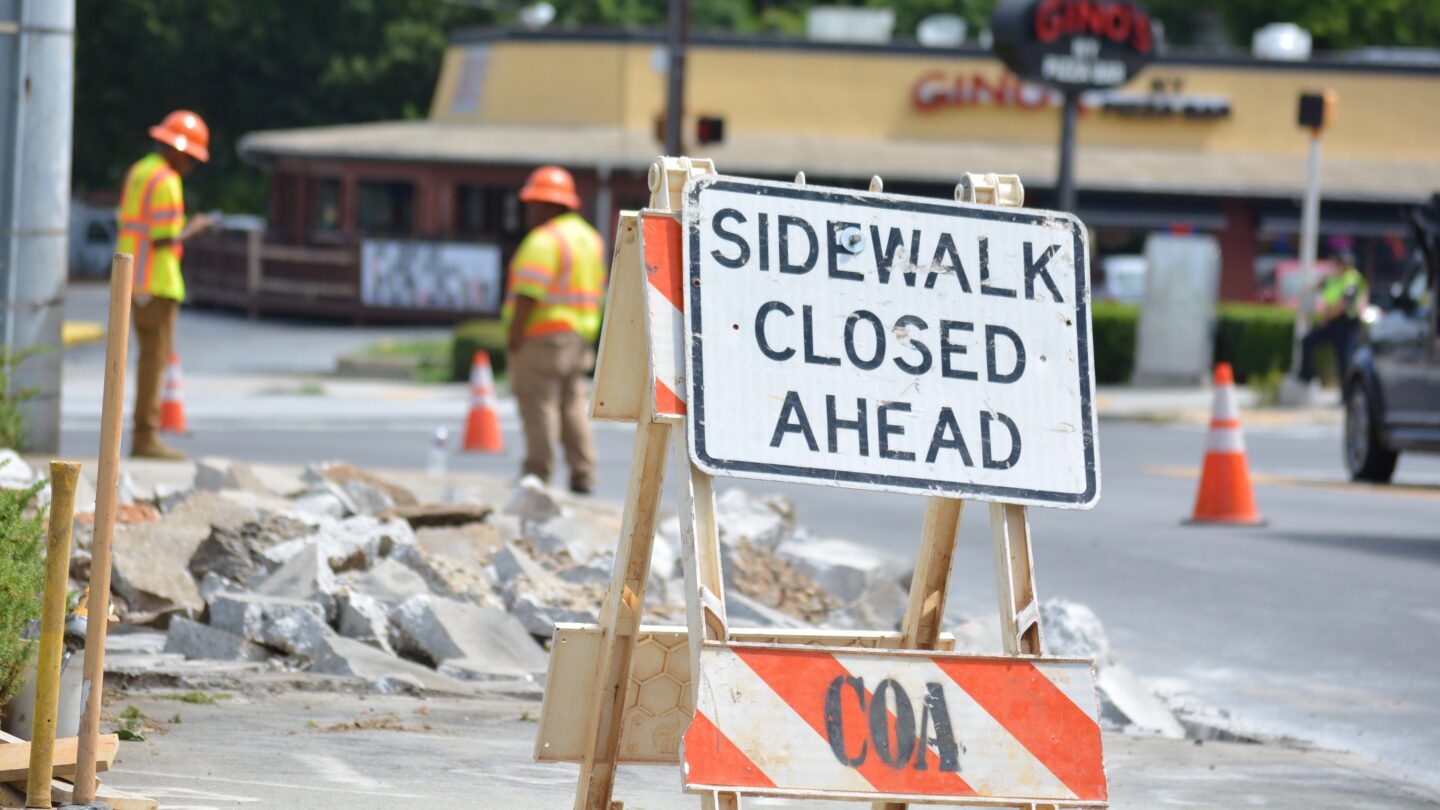‘Renew Atlanta’ Tackles Road Repairs And Other Upgrades

In November, residents of Fulton County and the city of Atlanta could vote to fix roads, sidewalks and intersections. That vote follows $250 million in infrastructure upgrades that Atlanta voters approved last year, which the city has already begun working on.
That referendum, approved overwhelmingly, allowed Atlanta to take out bonds to begin to tackle what city officials say is a billion-dollar backlog on infrastructure investments. The city began working almost immediately after the measure passed, said Faye DiMassimo, the general manager of the Renew Atlanta infrastructure bond program.
“There’s 3-400 projects total,” she said. “Everything from something as small as a roof replacement or heating and air replacement or a window replacement on a building.” Or in one case, an entirely new building, for the Martin Luther King Jr. Natatorium in Old Fourth Ward; work is already starting on a new indoor pool and rec center.
There are sidewalk fixes, traffic light upgrades, bridge repairs and road repaving. DiMassimo said they’re not just patching the potholes; the city is actually fixing the streets.
“We’re addressing all those underlying base conditions that you don’t see that are probably the reason for those potholes to begin with,” she said. “So that we’re not just topping.”
She said now the streets that are being repaired should hold up for 10 to 12 years.
It Just Revived the Whole Community
The city is also catching up on things that should have happened years ago. For instance, in a subdivision in southeast Atlanta, Villages at Oakshire, where the roads had never been fully paved.
“We’ve gone through stages of just, hopeless,” said Jerry Hicks, who lives in the subdivision.
The houses there were built and sold just before the Great Recession; when the housing market crashed, the builder of the subdivision left before finishing the streets. The roads were rough and gravelly, and manhole covers stuck up inches above the surface.
In April, with money from the infrastructure bond package, the roads were finally finished.
“I was taking pictures the whole day,” said Hicks, laughing. “I was videotaping the whole day.”
He said the effects go beyond just having the roads look better.
“It just revived the whole community,” he said. “You feel better about living here as well.”
The city chose the projects in a couple different ways. The Atlanta City Council made some decisions based on studies on the state of the roads and on city-owned buildings. Then each city council district got an equal chunk of money, and the councilmembers chose more local projects to get funded from that.
But every project isn’t getting quite the reception that the resurfacing in Village at Oakshire got.
Complete Streets
At neighborhood meeting in northwest Atlanta earlier this year, Renew Atlanta staff and consultants explained their vision for Fairburn Road, to transform it into what planners call, a “complete street” – adding bike lanes and crosswalks and narrowing some driving lanes.
“Widen the lane, do something else with it, but not bike lanes,” Vernelle Cowan, who lives in Collier Heights, told the organizers. That seemed to be the feeling of most of the dozen-or-so people at the meeting.
“I’m glad that they’re doing something out here in our geography,” Cowan said later. “Because most of the time we’re left out, out here. Everything is usually downtown, Midtown, intown, and north of town.”
But the idea the city came up with for her neighborhood, which she says has a lot of seniors and few cyclists, didn’t make sense to her.
“If they feel like that they need to have complete – what is it the man said? Complete street projects, then they need to convince us,” she said. “Because we’re out here driving every day.”
Some people do want bike lanes there, said DiMassimo, and it’s part of Atlanta’s long-term transportation plan.
“There’s already a notion that the transportation network of tomorrow has got to offer opportunity for a multitude of users,” she said.
Several other roads in Atlanta are up for complete streets redesigns under the program, including Martin Luther King Jr. Drive, DeKalb Avenue and Howell Mill Road.
The city plans to finish all the Renew Atlanta work by 2020. For big projects, like complete streets, Atlanta will hold more public meetings to collect feedback.
If voters approve a proposed sales tax for road and other transportation funding in November, the money raised would not go towards projects specifically slated for the Renew Atlanta program, but it could help fund related work. For example, road resurfacing at a particular intersection could be funded by the sales tax, while sidewalk repairs in the same area could be funded by the bond program.
9(MDAxODM0MDY4MDEyMTY4NDA3MzI3YjkzMw004))








